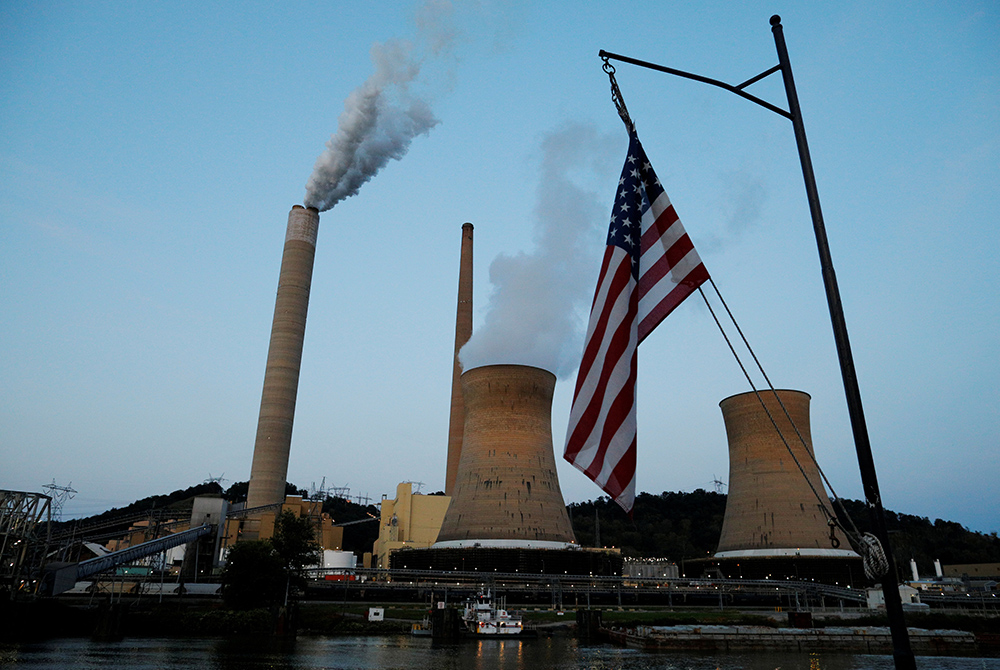
A coal-fired power-plant is seen along the Ohio River in Moundsville, West Virginia, in this 2017 file photo. (CNS/Reuters/Brian Snyder)
Rather unusually, we at NCR find ourselves in agreement with San Francisco Archbishop Salvatore Cordileone. This is certainly a time for prayer and fasting.
We just would not concur that Catholics across the United States need to be very focused on the state of U.S. House Speaker Nancy Pelosi's soul. Instead, they should be watching intently as the leaders of the world gather in Glasgow, Scotland, for the United Nations climate change summit, known as COP26.
Given that the very habitability of our planet may depend on the results of the summit, it is a good time for Catholics everywhere to be praying and fasting, in hopes that our leaders will finally (finally!) commit to doing whatever it takes to save the Earth we are destroying.
It is also a good time — really, well beyond a good time — for Catholics to act. Especially U.S. bishops and leaders of Catholic organizations that manage physical plants, including diocesan offices, parish churches, schools, cemeteries and numerous other facilities across the country.
The primary goal of the COP26 summit — in which some 20,000 national delegates, and thousands more activists and advocates will take part — is to try and limit the planet's warming to 1.5 degrees Celsius above preindustrial times. This is a key threshold to avoid devastating impacts such as rising seas, mass extinction events and heat waves the human body cannot easily survive.
In order to meet that goal, summit organizers say there are four main things countries will have to do: accelerate the transition away from coal use in energy production, slow deforestation, expedite the switch to electric vehicles, and buoy investment in renewable energy development projects.
On each of these fronts, American bishops and Catholic organization leaders could certainly lead by example and make substantial contributions to the country's emission reduction. The time is past when we should set goals and targets. It is time to act.
U.S. bishops have a special impetus to pursue concrete measures, given their relative silence on the climate crisis. As a recent academic study found, only 93 of the 12,077 columns written by diocesan bishops in their official publications from 2014-2019 mentioned climate change or global warming. The bishops, the researchers say, have been "overwhelmingly silent."
Advertisement
There are plenty of actions to take. Every Catholic school has a parking lot, and parking lots are ideal for installing a solar array. Every Catholic school also has a large utility bill, likely the second highest cost on its balance sheet after salaries. Why not eliminate that budget item entirely?
Catholic parishes, especially in suburbs and rural areas, also have large parking lots that would benefit from installing solar panels. The tax benefits can be given to the company that installs the panel in exchange for financing the project. That's right: No money upfront.
Bishops and pastors need only call the local office of the International Brotherhood of Electrical Workers to find a company that can install the solar panels with good-paying jobs. It's important to make sure that the transition to sustainable energy results in high-paying jobs.
Democrats in Congress are likely going to remove some environmental provisions in their expected spending package because West Virginia Sen. Joe Manchin is worried the provisions will put coal miners out of work. If people could already see that there are good-paying jobs on the other side of this transition, perhaps Manchin would not be so shortsighted.
In the next few years, millions of electric vehicle charging stations will need to be installed throughout the country. Church parking lots are not in use most of the time. Church steeples, built to point to the heavens, could now also indicate to travelers that an EV station is nearby.
Most dioceses give their priests a car allowance. It is time to make the allowance dependent on the priest driving an electric vehicle, or at least a hybrid. Yes, they can be a bit more expensive upfront but they save money in the long run because they often last longer and have lower maintenance costs.
Seven years ago in his landmark encyclical "Laudato Si', on Care for Our Common Home," Pope Francis called on the entire world to act to stop climate change. The pope warned that if we did not organize quickly we would be leaving to coming generations a planet of "debris, desolation and filth."
While national leaders debate this November in Glasgow, it is a good time for Catholics to pray and fast, yearning for real results.
But like activist Greta Thunberg, we all have had enough of the "blah, blah, blah." There is no time to waste. Bishops and Catholics with authority over physical plants in the U.S. must take every action they can to limit emissions and transition to clean energy now. Not in five or ten years. Now.




